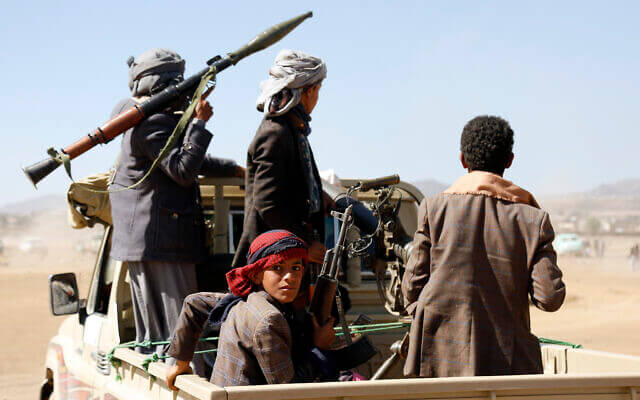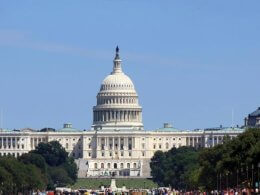On Wednesday, the Biden administration re-designated the Iran-backed Houthi terrorists as a Specially Designated Global Terrorist (SDGT) entity but not on the State Department's Foreign Terrorist Organization (FTO) amid the ongoing attacks by the Yemen-based militia.
"These attacks fit the textbook definition of terrorism," a senior administration official told reporters. "We've taken this action to pressure the Houthis to cease their terrorist activities, including missile and drone attacks against international shipping," the official added.
The designation is a partial reversal for the Biden White House, which removed the Houthis from the FTO list weeks after the President's inauguration in 2021.
At the time, United States officials argued that removing sanctions against the terrorist group was justified because it had unacceptable humanitarian costs for the people of Yemen.
Following the Oct. 7 massacre at the hands of Hamas against Israel, the Houthis have engaged in attacks against U.S. and commercial shipping vessels in the Red Sea, putting pressure on the administration to stop the Iran-backed proxy while avoiding a major military confrontation in the Middle East region.
"We believe that the SDGT designation is the appropriate tool, at the moment, to pressure the Houthis," a senior administration official told reporters. "With all sanctions, we are looking to make sure that our sanctions are effective in putting pressure on actors to cease activity that is problematic to achieve the foreign policy goals. We're always trying to make sure that the impact of our sanctions achieves the desired foreign policy effect while minimizing unintended consequences," the official added.
Foundation for Defense of Democracies (FDD) senior adviser Richard Goldberg, who worked on the Middle East and Iran during the Trump White House, explained to the Washington Examiner that the current administration understands that an FTO designation would "put maximalist pressure on the Houthis, which is why they won't do it."
"They want the Houthis legitimized enough to be a part of the governing structure in Yemen. They can get around that with OFAC licenses for the SDGT. Not so much with the FTO," Goldberg told the Washington Examiner.
On X (Twitter), Goldberg also pointed out that the Biden administration recently issued five general licenses to "gut its sanctions designation of the Houthis."
"This is why they chose not to re-list the Houthis as a Foreign Terrorist Organization. They wanted the press pop without the policy impact," he stated.
On the U.S. Department of Treasury's Office of Foreign Assets Control (OFAC) website, the office issued the following general licenses to the Houthis: "Counter Terrorism General License 22, which deals with 'Transactions Related to the Provision of Agricultural Commodities, Medicine, Medical Devices, Replacement Parts, and Components, or Software Updates Involving Ansarallah,' General License 23 'Authorizing Transactions Related to Telecommunications Mail, and Certain Internet-Based Communications Involving Ansarallah,' General License 24, 'Authorizing Noncommercial, Personal Remittances Involving Ansarallah,' General License 25, 'Authorizing Transactions Related to Refined Petroleum Products in Yemen Involving Ansarallah,' and General License 26, 'Authorizing Certain Transactions Necessary to Port and Airport Operations Involving Ansarallah.'"
Gabriel Noronha, a former State Department official under the Trump administration, took to social media to point out that the latest designations will mean that the Houthis can continue to obtain U.S. visas, that there is no criminal penalty to support them, and that American banks do not have to seize their monetary funds.
"The Biden Administration's Yemen policy was a mess from the start," Noronha told The Foreign Desk. "Instead of earning concessions from the Houthis in exchange for de-listing them both from terror sanctions and the Foreign Terrorist Organization list, he gave them unilateral relief. The Houthis have rewarded Biden's appeasement accordingly," he added.
The former State Department official stated that returning the Iran-backed terrorist group to the SDFT was only a "half-measure," which senior administration officials "immediately conceded they could rescind if the Houthis stop attacking ships."
"That's not the point of terror sanctions - they should be maintained until the terrorist groups are eliminated entirely," he said.
Regarding the sanction's aspect of the designation, Noronha explained that they will come into effect "exactly three years after Biden removed them."
"It's evidence of how Biden's Middle East policy has been a disaster across nearly every single country. The main miracle here is that this policy lasted contact with reality for a full three years - that's far longer than the rest of it," he said. "By refusing to label the Houthis as a Foreign Terrorist Organization, Biden is preventing several important policies to keep Americans safe and the Houthis weaker," Noronha explained.
The former State Department official noted that the FTO designation would have a "full blocking of visas for any Houthi members," reversing the current status quo that allows Houthi members to apply for and receive a U.S. visa.
An FTO designation would also allow the Department of Justice to "prosecute any American who swears allegiance or provides material support to the Houthis, with penalties and enforcement far more robust than the SDGT designation."
The third action that the FTO would allow, according to Noronha, is to grant victims impacted by the Houthis to "get compensation through legal action against any funds or assets that the Department of Justice can get their hands on and require U.S. banks to report any of their funds in their possession to the Treasury Department and OFAC."
Despite the latest aerial strikes from the U.S. and its allies against the Houthis in Yemen, the Iranian-backed group continues to attack U.S. Naval ships and commercial vessels without fear of any reprisals. In Tehran, the Ayatollahs have condemned the strikes by American and British forces, vowing to support the Houthis and other Islamic proxies against U.S. and Israeli forces in the Middle East.
Related Story: Houthis Ramp Up Attack Against American Forces in the Red Sea










